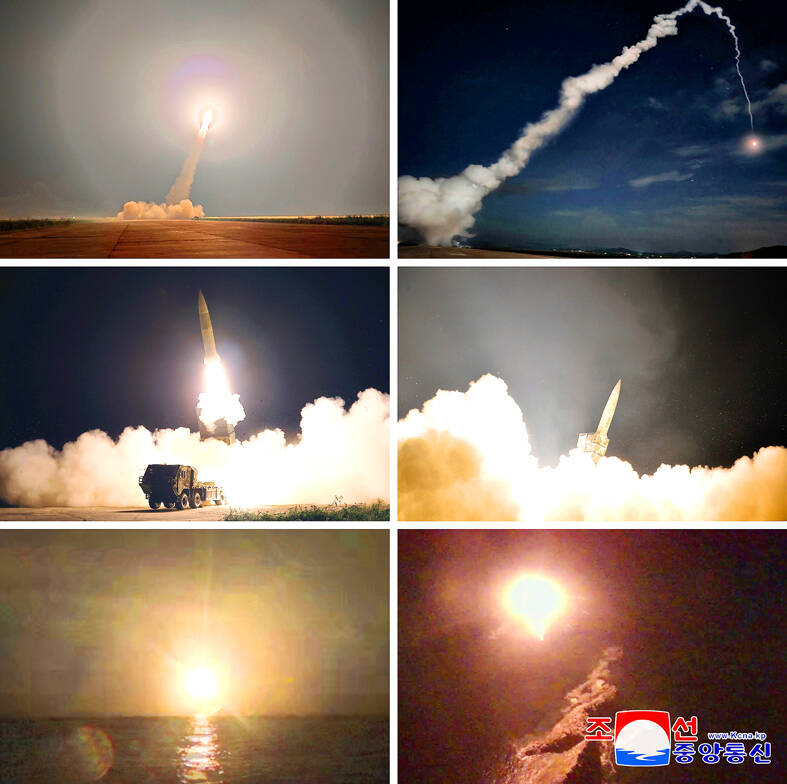North Korea yesterday said that its latest missile launches simulated “scorched earth” nuclear strikes on South Korea and that it has also been rehearsing an occupation of its rival’s territory in the event of conflict.
Pyongyang has previously tested nuclear-capable missiles and described how it would use them in potential wars with South Korea and the US. However, the North’s disclosure of detailed war plans reaffirmed its aggressive nuclear doctrine to intimidate its opponents, as it escalates its protest of the ongoing South Korean-US military exercises that it views as a major security threat, observers said.
North Korea’s military fired two tactical ballistic missiles from the capital on Wednesday night to practice “scorched earth strikes” at major command centers and operational airfields in South Korea, the official Korean Central News Agency (KCNA) said.

Photo: EPA-EFE
The North’s military said the missiles carried out their simulated strikes through air bursts, suggesting it confirmed the explosions of dummy warheads at a set altitude.
Pyongyang said its missile tests were in response to the US’ flyover of long-range B-1B bombers for a joint aerial training with South Korea earlier on Wednesday.
The aerial drill “is a serious threat to [North Korea] as it was just pursuant to the scenario for a pre-emptive nuclear strike at” North Korea, the Korean People’s Army (KPA) general staff said. “The KPA will never overlook the rash acts of the US forces and the [South Korean] military gangsters.”

Photo: EPA-EFE
The missile launches on Wednesday were the latest in the North’s barrage of weapons tests since last year.
The two short-range missiles traveled 360 to 400km at a maximum altitude of 50km before landing in the waters between the Korean Peninsula and Japan, South Korean and Japanese assessments showed.
South Korea’s Joint Chiefs of Staff called the launches “a grave provocation” that threatens international peace and violates UN Security Council resolutions that ban any ballistic launches by North Korea.
The US Indo-Pacific Command said that Washington’s commitment to the defense of South Korea and Japan remains “ironclad.”
KCNA said in a separate report that North Korean leader Kim Jong-un on Tuesday visited an army post where his military has been holding command post drills in response to the South Korean-US military training.
It said the drills are aimed at practicing procedures for “occupying the whole territory of the southern half” of the Korean Peninsula in the event of war.
Kim underscored the need to “deal a heavy blow at the enemy’s war potential and war command center and blinding their means of command communication at the initial stage of operation.”
Kim also detailed tasks to acquire an ability to launch “simultaneous super-intense strikes” at key enemy military targets and other sites whose destruction can cause social and economic chaos, KCNA said.

A Chinese aircraft carrier group entered Japan’s economic waters over the weekend, before exiting to conduct drills involving fighter jets, the Japanese Ministry of Defense said yesterday. The Liaoning aircraft carrier, two missile destroyers and one fast combat supply ship sailed about 300km southwest of Japan’s easternmost island of Minamitori on Saturday, a ministry statement said. It was the first time a Chinese aircraft carrier had entered that part of Japan’s exclusive economic zone (EEZ), a ministry spokesman said. “We think the Chinese military is trying to improve its operational capability and ability to conduct operations in distant areas,” the spokesman said. China’s growing

Nine retired generals from Taiwan, Japan and the US have been invited to participate in a tabletop exercise hosted by the Taipei School of Economics and Political Science Foundation tomorrow and Wednesday that simulates a potential Chinese invasion of Taiwan in 2030, the foundation said yesterday. The five retired Taiwanese generals would include retired admiral Lee Hsi-min (李喜明), joined by retired US Navy admiral Michael Mullen and former chief of staff of the Japan Self-Defense Forces general Shigeru Iwasaki, it said. The simulation aims to offer strategic insights into regional security and peace in the Taiwan Strait, it added. Foundation chair Huang Huang-hsiung

PUBLIC WARNING: The two students had been tricked into going to Hong Kong for a ‘high-paying’ job, which sent them to a scam center in Cambodia Police warned the public not to trust job advertisements touting high pay abroad following the return of two college students over the weekend who had been trafficked and forced to work at a cyberscam center in Cambodia. The two victims, surnamed Lee (李), 18, and Lin (林), 19, were interviewed by police after landing in Taiwan on Saturday. Taichung’s Chingshui Police Precinct said in a statement yesterday that the two students are good friends, and Lin had suspended her studies after seeing the ad promising good pay to work in Hong Kong. Lee’s grandfather on Thursday reported to police that Lee had sent

BUILDUP: US General Dan Caine said Chinese military maneuvers are not routine exercises, but instead are ‘rehearsals for a forced unification’ with Taiwan China poses an increasingly aggressive threat to the US and deterring Beijing is the Pentagon’s top regional priority amid its rapid military buildup and invasion drills near Taiwan, US Secretary of Defense Pete Hegseth said on Tuesday. “Our pacing threat is communist China,” Hegseth told the US House of Representatives Appropriations Subcommittee on Defense during an oversight hearing with US General Dan Caine, chairman of the Joint Chiefs of Staff. “Beijing is preparing for war in the Indo-Pacific as part of its broader strategy to dominate that region and then the world,” Hegseth said, adding that if it succeeds, it could derail